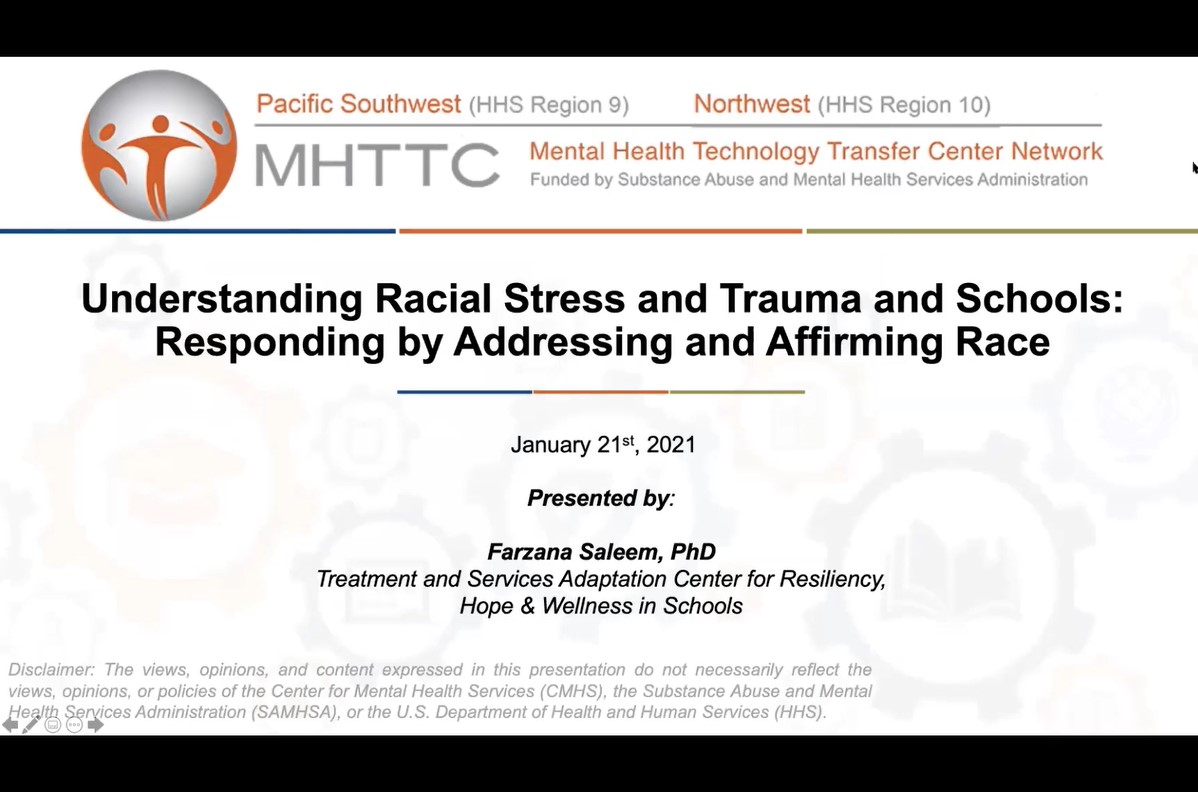
Research has demonstrated that race-related stressors undermine the psychological health and academic adjustment of youth of color, and this is particularly salient for African American and Latinx adolescents. School is an important context to understand and address students’ racial experiences given the significant amount of time students spend there and the frequency in which youth also report encountering and processing race-based incidents in school. It is is critical to recognize the unique role that schools can potentially have in providing racial socialization, reducing racial stress, and promoting a healthy racial climate. As such, the current webinar will provide an overview of racial stress and trauma (RST) and its consequences for students of color, with a focus on African American and Latinx adolescents. The presentation will highlight methods that teachers, school counselors, and school leadership can use to discuss race, promote resilience in the face of RST, and implement a school wide approach to address RST.
Learning Objectives:
Resources:
 Dr. Farzana Saleem is a University of California Chancellor’s Postdoctoral Research Fellow at the University of California Los Angeles. Dr. Saleem has a joint appointment in the Semel Institute for Neuroscience and Human Behavior and the Graduate School of Education and Information Studies, with affiliation in the Ralph J. Bunche Center for African American Studies. She received her PhD in the Clinical-Community Psychology doctoral program at the George Washington University and completed a child and adolescent clinical internship, with a specialization in trauma, at Children’s Hospital Los Angeles. Dr. Saleem conducts community and school-based research focused on identifying factors across contexts that can reduce the effects of racial discrimination on the psychological adjustment of adolescents, with a focus on understanding ethnic-racial socialization in families and schools. She is interested in conducting empirical research and creating programs/interventions focused on reducing racial stress, eradicating mental health and academic racial disparities, and promoting the well-being of marginalized and racially diverse youth, families, and communities.
Dr. Farzana Saleem is a University of California Chancellor’s Postdoctoral Research Fellow at the University of California Los Angeles. Dr. Saleem has a joint appointment in the Semel Institute for Neuroscience and Human Behavior and the Graduate School of Education and Information Studies, with affiliation in the Ralph J. Bunche Center for African American Studies. She received her PhD in the Clinical-Community Psychology doctoral program at the George Washington University and completed a child and adolescent clinical internship, with a specialization in trauma, at Children’s Hospital Los Angeles. Dr. Saleem conducts community and school-based research focused on identifying factors across contexts that can reduce the effects of racial discrimination on the psychological adjustment of adolescents, with a focus on understanding ethnic-racial socialization in families and schools. She is interested in conducting empirical research and creating programs/interventions focused on reducing racial stress, eradicating mental health and academic racial disparities, and promoting the well-being of marginalized and racially diverse youth, families, and communities.
The Northwest MHTTC and the Pacific Southwest MHTTC are continuing our partnership to provide and extend deeper technical assistance on the Interconnected Systems Framework (ISF).
Interconnected Systems Framework (ISF) is a structure and process that maximizes effectiveness and efficiency by blending the strengths of school and community mental health with strengths of the multi-tiered framework of PBIS (Barrett, Eber, Weist, 2013)
This past year, we offered three webinars on the Interconnected Systems Framework (see below for recordings) and followed the learning series up with monthly discussion hours led by Susan Barrett and field leaders from our region.
This year, we are offering more programming to deepen your ISF work and contextualize ISF to this moment of COVID-19 and beyond. Our fall offering is made up of four modules and ends with a town hall for you to be able to ask faculty your questions and resource one another. Each module includes teaching from Susan Barrett and field leaders on ISF systems, and USC faculty on ISF practices.
Want more information and school mental health resources? Visit the Northwest MHTTC's School Mental Health page and sign up for our monthly newsletter for regular updates about events, trainings, and resources available to the Northwest region.